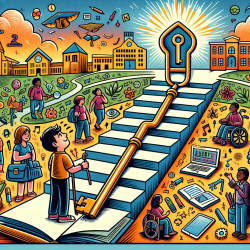Introduction
In the field of special education, practitioners often face challenges that require resilience and adaptability. The research paper titled ‘Pressure creates diamonds’/‘fire refines gold’: Conceptualizing coping capital offers insights into how coping with adversity can generate valuable resources, or "coping capital," that can be leveraged to improve professional skills and personal growth.
Understanding Coping Capital
The concept of coping capital, as introduced by Kapoor and Belk, draws on Bourdieu’s notion of capital. It suggests that the skills and competencies developed through coping with adversity can exist in an embodied state, providing long-term benefits. This capital can be intentionally or unintentionally acquired and may lead to both anticipated and unanticipated benefits.
Practical Applications for Practitioners
For special education practitioners, understanding and utilizing coping capital can be transformative. Here are some ways to apply these insights:
- Reflect on Past Challenges: Consider past adversities faced in your career and identify the skills and strengths developed as a result. This reflection can help recognize your coping capital.
- Intentional Skill Building: Engage in professional development opportunities that challenge you, such as workshops or conferences. These experiences can intentionally build coping capital by expanding your skill set.
- Leverage Unanticipated Benefits: Be open to unexpected outcomes from challenging situations. These can often provide new perspectives and opportunities for growth.
- Foster Resilience in Students: Use your understanding of coping capital to help students develop their own resilience. Encourage them to view challenges as opportunities for growth.
Encouraging Further Research
While the concept of coping capital offers valuable insights, further research can deepen our understanding of its applications in special education. Practitioners are encouraged to explore how coping capital can be measured and how it influences long-term career development and student outcomes.
Conclusion
By embracing the concept of coping capital, special education practitioners can transform challenges into opportunities for growth and skill enhancement. This approach not only benefits their professional development but also positively impacts the students they serve. To read the original research paper, please follow this link: ‘Pressure creates diamonds’/‘fire refines gold’: Conceptualizing coping capital.










